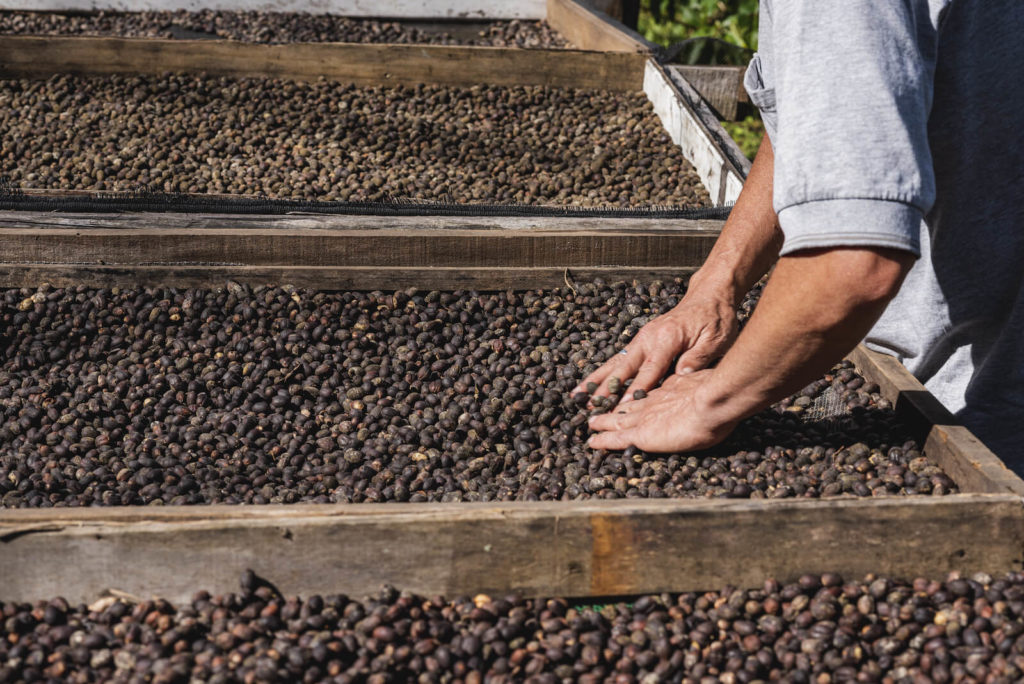Articles
Evidence based
Evidence Based
This article is based on scientific evidence, written by experts and fact checked by experts.
Our team of licensed nutritionists and dietitians strive to be objective, unbiased, honest and to present both sides of the argument.
This article contains scientific references. The numbers in the parentheses (1, 2, 3) are clickable links to peer-reviewed scientific papers.
Written by  Dr. Michael Ruscio, DC onAugust 19, 2021
Dr. Michael Ruscio, DC onAugust 19, 2021
Written by  Dr. Michael Ruscio, DC on August 19, 2021 —Reviewed by
Dr. Michael Ruscio, DC on August 19, 2021 —Reviewed by  Aimee Gallo
Aimee Gallo
Does Coffee Help or Harm Your Gut?
- History of Coffee|
- Health Benefits of Coffee|
- Coffee and Gut Health|
- What About Mold?|
- Is Coffee Good For You?|
- Recommended Products|
Key Takeaways:
- Large meta-analyses of coffee consumption have found that coffee is safe for most people and even beneficial for many people [1, 2].
- There are many potential benefits of coffee for gut health, such as improved bowel movements, lower inflammation, and even faster gastrointestinal recovery after abdominal surgery [3, 4].
- Some diets, such as the Autoimmune Paleo Diet (AIP Diet,) that work to improve gut health do remove coffee [5, 6]. Removal of coffee is just one part of the diet and these diets are usually temporary.
- If coffee does seem to bother your gut, there is likely an underlying issue that needs to be addressed.
Download this Episode (right click link and ‘Save As’)
Some people say coffee is basically the elixir of life. Others say it is full of mycotoxins or chemicals that are not safe for the stomach. Let’s take a look at what the research actually says about coffee and gut health.

A Short History of Coffee
No one knows exactly when the process of drinking coffee started, but we do know that it has been around since at least the 15th century.
Coffee is probably best known for its energy enhancing side effects, and there is even a story that coffee was first discovered by an Ethiopian goat herder who noticed that after eating berries from certain trees, his goats were so energetic that they did not want to sleep at night. When local monks heard of this story, they started making a drink out of the berries to help them stay awake through long prayer sessions [7]. Humans have used coffee ever since.
Coffee is made from harvested berries of Coffea plants. After coffee “cherries” are harvested, they need to be processed either with a wet or dry processing method. After processing, the beans are dried, milled (hulled, polished, and sorted), roasted, and exported. In order to make a cup of coffee, we may grind our own beans or buy them pre-ground [8].
Gut Health Benefits of Coffee

In general, coffee has been found to have health benefits for most people. In fact, an evaluation of 112 meta-analyses of observational studies showed that coffee likely has antioxidant and anti-inflammatory properties. When coffee is consumed over time, these can help to protect against inflammation and chronic inflammatory disease [1].
Decreasing inflammation is beneficial to gut health. Studies have shown that coffee probably has antioxidant, anti-inflammatory, and anti-cancer effects on the lining of the digestive tract [3].

When looking at coffee and gut health specifically, there are a few potential positive effects of coffee:
- People who drank coffee after abdominal surgery recovered gastrointestinal function more quickly than those who didn’t [4].
- Coffee can improve motility (movement of the bowels) in people with constipation [9]. However, that may also mean that coffee may not be helpful for people with diarrhea.
- Coffee has been shown to increase beneficial bacterial strains like Bifidobacteria, which may improve the gut microbiome in some people [10, 11].
Can Coffee Trigger Digestive Symptoms?
In spite of the potential benefits mentioned above, we’re often told (or may have found through personal experience) that drinking coffee triggers or causes a few gastrointestinal issues. Most often, those are IBS, heartburn, and leaky gut. Let’s look at what the research has to say about coffee consumption and these health issues.

Irritable Bowel Syndrome (IBS)
One observational study found that the odds of coffee drinkers developing IBS were 44% greater than those who never drank coffee. The odds were highest in people who drank at least 106.5 mg of caffeine per day [12]. One cup of brewed regular coffee has 95 mg of caffeine and decaf coffee has about 2 mg of caffeine per cup [13]. An informational article from Johns Hopkins lists caffeine (from all sources such as coffee, tea, soda, chocolate, and some headache pills) as one of the top five foods to remove in IBS, because caffeine can stimulate diarrhea [14].
It is important to remember that these are really observations of caffeine intake, not so much coffee alone. Also, there have not yet been any randomized clinical trials to assess coffee’s role in either causing or exacerbating IBS. Rather, it has been observed that anything high in caffeine may increase diarrhea in people with IBS, which is why many people with IBS feel better lowering caffeine consumption [15].
If you have IBS, you may want to cut out coffee while you work to heal your gut, most often by eating an anti-inflammatory, whole and unprocessed foods diet, such as the low-FODMAP diet.

Reflux and Heartburn
Coffee may promote the development of laryngopharyngeal reflux, GERD (gastroesophageal reflux disease), and heartburn, although coffee alone was not studied. Rather, it was part of a longer list of foods and beverages such as alcohol and certain vegetables that seem to be associated with reflux [16, 17].
One small randomized clinical trial of 30 people who were identified to be sensitive to coffee and also have symptoms of GERD (heartburn and/or acid reflux) or dyspepsia (upper abdominal burning) found that drinking coffee caused heartburn, regurgitation, and dyspepsia in most participants. This study also looked at the types of coffee roasting. It found that differences in roasting processes did not cause differences in coffee-induced upper gastrointestinal symptoms [18].
Leaky Gut
Leaky gut (intestinal permeability) is when the lining of the gastrointestinal tract becomes permeable. This weakening of the gut lining then allows toxins to pass into the bloodstream and travel to the brain or other areas of the body, causing systemic inflammation [19]. Many people with leaky gut, or any of the autoimmune conditions associated with leaky gut, report that coffee consumption triggers leaky gut symptoms, such as diarrhea or stomach pain. For this reason, many people with leaky gut cut out coffee as they work to heal their leaky gut.
A 2010 literature review suggested that green coffee (coffee made from unroasted coffee beans, which is not what most of us normally buy) may contribute to leaky gut more than dark roasted coffee. Green coffee has a higher concentration of alpha-dicarbonyls, which are highly prone to glycation (the binding of sugars to proteins or lipids). However, both green and dark roasted coffee have advanced glycation end products (AGEs), which can induce inflammation and may exacerbate leaky gut [20].
Just a note about instant coffee: It has been found to be contaminated with gluten [21]. If you have celiac disease or are sensitive to gluten, instant coffee may not be a good option for you.
A Note About Observational Studies
When looking at the research on coffee, it is important to understand the different types of research studies. In this case, these are observational studies vs. randomized clinical trials (RCT).
RCTs are considered the best type of research, as they control for all factors and seek to find the exact reasons why and how something may be helping or causing harm. In a randomized clinical trial (RCT), participants are randomly put into a very specific and controlled environment in which to test a medication or lifestyle intervention.
Observational studies or reviews of literature look at self-reported correlations in the population. For example, many people with IBS report that drinking coffee triggers diarrhea. However, an observational study does not investigate the mechanism of action, or exactly how and why, coffee triggers an IBS flare-up.
Similarly, observational studies may find that those who regularly consume coffee also have a lower risk of developing a certain kind of disease. But this doesn’t necessarily mean that coffee directly reduces disease risk– it simply points to an association.
These observational studies should not be discounted. They can help guide researchers to discover what they may want to do a clinical trial on. These studies also assist other IBS sufferers by letting them know that cutting coffee may help decrease symptoms, even if we do not know why yet. Still, it’s always important to take these findings with a grain of salt.

What About Mold in Coffee?
When reading about coffee and gut health, you have probably seen claims that coffee contains mycotoxins, fungi, or mold. It’s claimed that these toxins can cause a host of health disorders, everything from leaky gut to brain fog.
Mycotoxins are toxic compounds produced by certain fungi (molds) and are found in many foods and drinks [22, 23].
We go in-depth discussing mycotoxins in coffee and their effects on health in this article. The short summary is that trace amounts of mycotoxins have been found in some coffee. That being said, there are currently no studies that support the assumption that these toxins are at a level that are harmful to our health. In fact, one study showed that coffee drinking did not risk mycotoxin contamination [24].
Anecdotally, some people who are more sensitive to mold report having gastrointestinal symptoms when they drink coffee but not when drinking coffee that has been tested to be low or absent of mold. However, we have been unable to find reputable studies that show any coffee is mycotoxin-free or that a claimed mold-free coffee would cause less stomach distress. The main takeaway here is to always listen to your gut (and body), and if coffee seems to exacerbate any symptoms, cut it out as you work on healing.

Is Coffee Good For You?
Generally, if your gut health is good, coffee should be perfectly fine for you to consume. In fact, it may be beneficial to digestive health due to its anti-inflammatory properties. About two cups of coffee per day are likely good for overall health.
In fact, a 2019 meta-analysis of 40 observational studies and nearly 4 million study participants found that 3.5 cups of coffee per day was associated with the lowest risk of death from any cause at -15%. 2.5 cups per day was associated with the lowest risk of death from heart disease at -17% [25].
However, if your digestive system is not doing well and you experience stomach pain, diarrhea, bloating, or reflux, you may not want to drink coffee as it may trigger symptoms. Focus first on creating a healthy gut with a low-inflammatory diet and probiotics to balance gut bacteria. Once your gut health has been restored, you will probably be able to add coffee back into your life.
It is important to remember that when we have been dealing with chronic diseases, there are many things that may trigger flare ups. While it is very helpful to know if coffee may be one of these triggers, it is even more important to work on the root cause of illness and heal. Cutting out triggers during the healing process is very helpful. While it seems overwhelming at the time, rest assured that you will be able to reintroduce many things back into your life once you are doing better.If you would like more personalized help with assessing and fixing your health, please reach out to us at our clinic. We would be happy to work with you and get you on the path to healing.
Dr. Michael Ruscio is a DC, Naturopathic Practitioner, researcher, and clinician. He serves as an Adjunct Professor at the University of Bridgeport and has published numerous papers in scientific journals as well as the book Healthy Gut, Healthy You. He also founded the Ruscio Institute of Functional Health, where he helps patients with a wide range of GI conditions and serves as the Head of Research.➕ References
- Grosso G, Godos J, Galvano F, Giovannucci EL. Coffee, caffeine, and health outcomes: an umbrella review. Annu Rev Nutr. 2017 Aug 21;37:131–56. DOI: 10.1146/annurev-nutr-071816-064941. PMID: 28826374.
- Poole R, Kennedy OJ, Roderick P, Fallowfield JA, Hayes PC, Parkes J. Coffee consumption and health: umbrella review of meta-analyses of multiple health outcomes. BMJ. 2017 Nov 22;359:j5024. DOI: 10.1136/bmj.j5024. PMID: 29167102. PMCID: PMC5696634.
- Iriondo-DeHond A, Uranga JA, Del Castillo MD, Abalo R. Effects of Coffee and Its Components on the Gastrointestinal Tract and the Brain-Gut Axis. Nutrients. 2020 Dec 29;13(1). DOI: 10.3390/nu13010088. PMID: 33383958. PMCID: PMC7824117.
- Eamudomkarn N, Kietpeerakool C, Kaewrudee S, Jampathong N, Ngamjarus C, Lumbiganon P. Effect of postoperative coffee consumption on gastrointestinal function after abdominal surgery: A systematic review and meta-analysis of randomized controlled trials. Sci Rep. 2018 Nov 26;8(1):17349. DOI: 10.1038/s41598-018-35752-2. PMID: 30478433. PMCID: PMC6255780.
- Konijeti GG, Kim N, Lewis JD, Groven S, Chandrasekaran A, Grandhe S, et al. Efficacy of the autoimmune protocol diet for inflammatory bowel disease. Inflamm Bowel Dis. 2017 Nov;23(11):2054–60. DOI: 10.1097/MIB.0000000000001221. PMID: 28858071. PMCID: PMC5647120.
- Eswaran S, Dolan RD, Ball SC, Jackson K, Chey W. The Impact of a 4-Week Low-FODMAP and mNICE Diet on Nutrient Intake in a Sample of US Adults with Irritable Bowel Syndrome with Diarrhea. J Acad Nutr Diet. 2020 Apr;120(4):641–9. DOI: 10.1016/j.jand.2019.03.003. PMID: 31103370.
- What is Coffee? [Internet]. [cited 2021 Aug 2]. Available from: https://www.ncausa.org/About-Coffee/What-is-Coffee
- 10 Steps from Seed to Cup [Internet]. [cited 2021 Aug 2]. Available from: https://www.ncausa.org/about-coffee/10-steps-from-seed-to-cup
- Rao SS, Welcher K, Zimmerman B, Stumbo P. Is coffee a colonic stimulant? Eur J Gastroenterol Hepatol. 1998 Feb;10(2):113–8. DOI: 10.1097/00042737-199802000-00003. PMID: 9581985.
- Jaquet M, Rochat I, Moulin J, Cavin C, Bibiloni R. Impact of coffee consumption on the gut microbiota: a human volunteer study. Int J Food Microbiol. 2009 Mar 31;130(2):117–21. DOI: 10.1016/j.ijfoodmicro.2009.01.011. PMID: 19217682.
- Mansour A, Mohajeri-Tehrani MR, Karimi S, Sanginabadi M, Poustchi H, Enayati S, et al. Short term effects of coffee components consumption on gut microbiota in patients with non-alcoholic fatty liver and diabetes: A pilot randomized placebo-controlled, clinical trial. EXCLI J. 2020 Mar 2;19:241–50. DOI: 10.17179/excli2019-2021. PMID: 32256270. PMCID: PMC7105939.
- Koochakpoor G, Salari-Moghaddam A, Keshteli AH, Esmaillzadeh A, Adibi P. Association of coffee and caffeine intake with irritable bowel syndrome in adults. Front Nutr. 2021 Jun 15;8:632469. DOI: 10.3389/fnut.2021.632469. PMID: 34211993. PMCID: PMC8241212.
- Is decaf coffee safe? [Internet]. [cited 2021 Aug 2]. Available from: https://www.ncausa.org/Decaffeinated-Coffee
- 5 Foods to Avoid if You Have IBS | Johns Hopkins Medicine [Internet]. [cited 2021 Jul 29]. Available from: https://www.hopkinsmedicine.org/health/conditions-and-diseases/irritable-bowel-syndrome-ibs/5-foods-to-avoid-if-you-have-ibs
- Capili B, Anastasi JK, Chang M. Addressing the role of food in irritable bowel syndrome symptom management. J Nurse Pract. 2016 May;12(5):324–9. DOI: 10.1016/j.nurpra.2015.12.007. PMID: 27429601. PMCID: PMC4944381.
- Lechien JR, Bobin F, Mouawad F, Zelenik K, Calvo-Henriquez C, Chiesa-Estomba CM, et al. Development of scores assessing the refluxogenic potential of diet of patients with laryngopharyngeal reflux. Eur Arch Otorhinolaryngol. 2019 Dec;276(12):3389–404. DOI: 10.1007/s00405-019-05631-1. PMID: 31515662.
- Kesari SP, Chakraborty S, Sharma B. Evaluation of Risk Factors for Laryngopharyngeal Reflux among Sikkimese Population. Kathmandu Univ Med J (KUMJ). 2017;15(57):29–34. PMID: 29446359.
- DiBaise JK. A randomized, double-blind comparison of two different coffee-roasting processes on development of heartburn and dyspepsia in coffee-sensitive individuals. Dig Dis Sci. 2003 Apr;48(4):652–6. DOI: 10.1023/a:1022860019852. PMID: 12741451.
- Camilleri M. Leaky gut: mechanisms, measurement and clinical implications in humans. Gut. 2019 Aug;68(8):1516–26. DOI: 10.1136/gutjnl-2019-318427. PMID: 31076401. PMCID: PMC6790068.
- Rapin JR, Wiernsperger N. Possible links between intestinal permeability and food processing: A potential therapeutic niche for glutamine. Clinics (Sao Paulo). 2010 Jun;65(6):635–43. DOI: 10.1590/S1807-59322010000600012. PMID: 20613941. PMCID: PMC2898551.
- Vojdani A, Tarash I. Cross-Reaction between Gliadin and Different Food and Tissue Antigens. FNS. 2013;04(01):20–32. DOI: 10.4236/fns.2013.41005.
- Alshannaq A, Yu J-H. Occurrence, toxicity, and analysis of major mycotoxins in food. Int J Environ Res Public Health. 2017 Jun 13;14(6). DOI: 10.3390/ijerph14060632. PMID: 28608841. PMCID: PMC5486318.
- Pallarés N, Carballo D, Ferrer E, Fernández-Franzón M, Berrada H. Mycotoxin Dietary Exposure Assessment through Fruit Juices Consumption in Children and Adult Population. Toxins (Basel). 2019 Nov 22;11(12). DOI: 10.3390/toxins11120684. PMID: 31766649. PMCID: PMC6950291.
- García-Moraleja A, Font G, Mañes J, Ferrer E. Analysis of mycotoxins in coffee and risk assessment in Spanish adolescents and adults. Food Chem Toxicol. 2015 Dec;86:225–33. DOI: 10.1016/j.fct.2015.10.014. PMID: 26514696.
- Kim Y, Je Y, Giovannucci E. Coffee consumption and all-cause and cause-specific mortality: a meta-analysis by potential modifiers. Eur J Epidemiol. 2019 Aug;34(8):731–52. DOI: 10.1007/s10654-019-00524-3. PMID: 31055709.
Recommended Products
Getting Started

